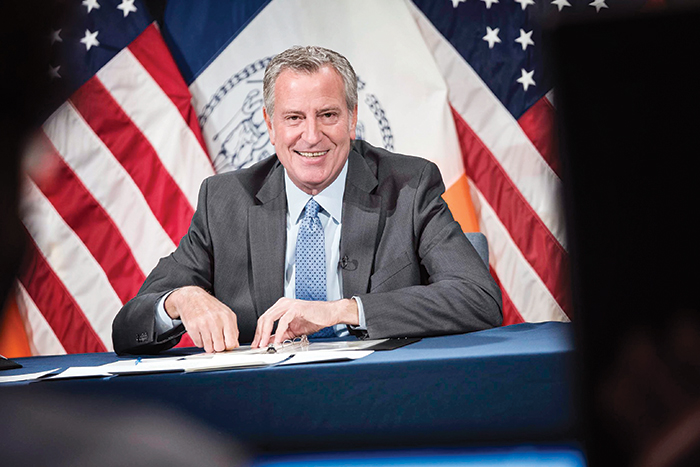Photo Courtesy of Ed Reed/Mayoral Photography Office
“Climate change is happening now and we have the guide we need to ensure our public infrastructure is protected in New York City,” Mayor de Blasio said.
By Forum Staff
Mayor Bill de Blasio on Monday announced a new pilot program that will help ensure new City infrastructure and public facilities are prepared for the worsening impacts of climate change, including intense rainfall, coastal storm surge, chronic high tide flooding, and extreme heat.
Under this program, 23 City capital agencies will begin designing and constructing dozens of new projects using the NYC Climate Resiliency Design Guidelines, which were developed by the Mayor’s Office of Climate Resiliency using cutting-edge science and research. These guidelines translate future-looking climate change projections into technical guidance that engineers and architects will use as they design roads, buildings, sewer systems, hospitals, public housing, and other pieces of critical public infrastructure. This ensures that projects constructed today will be prepared for worsening extreme weather decades into the future and can continue to provide critical services to New Yorkers.
Forty pilots were selected through a rigorous process that considered climate exposure, equity, and project scope. Over 40 percent of projects being advanced under this program range will be constructed in environmental justice areas. They range in budget from $3 million up to $1 billion and include a wide diversity of facilities spread across all five boroughs. The cohort of projects will apply resilient design principles from the very beginning of their design.
The projects being advanced under this program include:
- Horizon Adolescent Facility Expansion (ACS)
- Canarsie Library Overhaul (BPL)
- Kingsborough Community College Hot Water Heat Piping Distribution (CUNY)
- Queens Courthouse Upgrades and Renovations (DCAS)
- Queens County Farm Museum: New Education Center (DCLA)
- Harlem Stage at The Gatehouse: HVAC Upgrade (DCLA)
- Reconstruction of Paerdegat Pumping Station (DEP)
- Owls Head Wastewater Resource Recovery Facility Main Sewage Pump Replacement (DEP)
- Mahopac Wastewater Treatment Plant Upgrades (DEP)
- Arcady Road Reconstruction (DEP)
- Mid Staten Island Bluebelt (DEP/DOT)
- Leonard Covello Senior Center Upgrades (DFTA)
- Harlem Shelter Improvements (DHS)
- New Manhattan Detention Facility (DOC)
- Washington Heights Health Center Exterior Renovation (DOHMH)
- Manhattan Greenway – Inwood (DOT)
- Harper Street Administration Building (DOT)
- Reconstruction of Shore Road Bridge (DOT)
- Queens 1 Luyster Creek Garage Construction (DSNY)
- Brooklyn Army Terminal Elevators (EDC)
- Hunters Point South Ferry Landing Reconstruction (EDC)
- Engine 91 Renovation (FDNY)
- Fort Totten Utilities Improvements (FDNY)
- Partially funded renovation of a pediatric hospital facility on Staten Island (H+H)
- Brownsville Community Center (HRA)
- Gowanus Green, new affordable housing (HPD)
- New affordable housing development in The Bronx (HPD)
- Renovated affordable housing project in Brooklyn (HPD)
- Wagner Community Center (NYCHA)
- Jefferson Playground Reconstruction (NYCHA)
- 23rd Street Warehouse Rebuild (NYPD)
- Rodman’s Neck Facilities Improvements (NYPD)
- New Dorp HVAC Improvements (NYPL)
- Dalton Recreation Center Reconstruction (Parks)
- Haffen Park Improvements (Parks)
- 107th Street Pier and Bobby Wagner Walk Reconstruction (Parks)
- Jackson Heights Library Expansion (QPL)
- Sunset Park Sub-District School Construction in Brooklyn (SCA)
- New School Construction in Queens (SCA)
- New School Construction – site to be determined (SCA)
“Climate change is happening now and we have the guide we need to ensure our public infrastructure is protected in New York City,” de Blasio said. “Roads, hospitals, public housing, and buildings need to be designed with the impact of extreme weather in mind and the NYC Climate Resiliency Design Guidelines will make sure that happens.”

